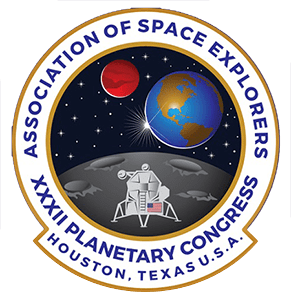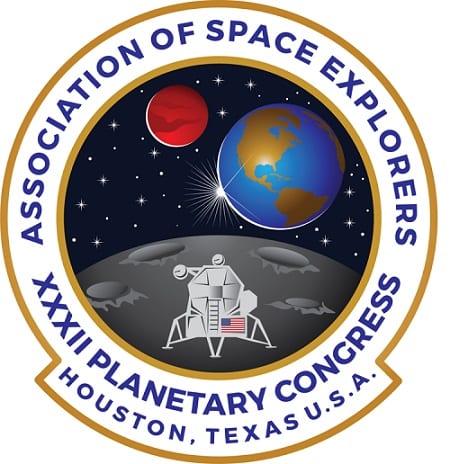This Year’s Planetary Congress, almost as Sci-Fi as You’d Imagine
October 24th, 2019
by Andrea Lloyd

What do you think about when you hear the words planetary congress? The Federation leaders having a meeting? The All Systems Commonwealth resuming its activity? Well, you would be a bit far from the truth, but not that far…
Every year, spaceflyers convene. The meeting is often unnoticed by the public, but not from lack of media. This year, with the congress in Houston, home of NASA’s Mission Control and Astronaut Corps, local media has highlighted that 125 astronauts, cosmonauts, and taikonauts from 38 different nations have traveled into America’s fourth-largest city for the week-long 32nd Planetary Congress.

What is the Planetary Congress?
Since 1985, the Association of Space Explorers (ASE) served a forum to interact professionally, present programs to the public, and engage the community.
Held in public venues such as Texas A&M University, Space Center Houston, and the University of Houston, the annual Planetary Congress generate conversation on topics that intersect with space exploration, such as the space community, government agencies, and public science, technology, engineering and mathematics (STEM) education.
What a spectacular week of Congress! #ASE32 was truly one to remember. The largest delegate gathering in history spent their week celebrating the last 50 years of spaceflight and encouraging the next generation of space explorers!#ASE32 #Astronauts #Cosmonauts@ASE_Astronauts pic.twitter.com/eNLUvyYHtP
— ASE XXXII Planetary Congress (@ASE32ndCongress) October 22, 2019
In the previous 34 years, the United States has hosted three congresses: Washington, D.C. (1992), Salt Lake City (2005), and Seattle (2008). The mechanics of the conference are eight technical sessions, community day, and formal ceremonies. Overall, the Planetary Congress seeks to stimulate interest in STEM, attract attention to space exploration, and promote international cooperation.
This Year’s Planetary Congress Was all About Going Further and Deeper into Space
Corresponding with the 50th Anniversary of the Apollo 11 Moon Landing, this year the event’s theme was “Celebrating Apollo: Inspiring the Future.” As NASA gets ready to return to the moon by 2024 with the Artemis program, chatter inevitably ensues about how to stand on the shoulders of the Apollo giants and continue space exploration farther into the future.
According to Professor Bonnie J. Dunbar Ph.D., a retired astronaut, professor of aerospace engineering at Texas A&M University and ASE XXXII Planetary Congress chair
Each year, we are invited by a different nation to share the knowledge we acquire from space exploration and to inspire the next generation of scientists, engineers, and explorers. So, it is only fitting to have the Congress return to the U.S., to the location where our journey to the Moon first began more than 50 years ago.
“Technical Sessions” describe the forums where the space flyers discuss space topics. All sessions were open to the public; you can go back and watch them on the Planetary Congress’s website.
This Year’s Planetary Congress Themes
- The Impact of Apollo, Today and Tomorrow: Explore the significance of the 1960s Apollo program on both technology development and socio-cultural impacts on people around the world.
- The Apollo Experience: Told through the men of the Apollo program, including Tom Stafford, Wallt Cunningham, Rusty Schweickart, and Fred Haise, the panel discusses what is necessary for successful lunar missions as well as the future of space exploration and international cooperation.
- The Next 50 Years: Challenges for Future Exploration: Considering the next challenges of the Moon and Mars, government agencies are seeking commercial partners.
- Space Suit Developments for Future Exploration: Increased space activities lead to the needed development of new intravehicular and extravehicular space suits.
Meeting up with 125 colleague astronauts from 38 countries. Beautiful week in Houston, discussing past, present and planned moon exploration. #ASE32 #Apollo50 @ASE_Astronauts pic.twitter.com/5ofo3GD0AC
— André Kuipers (@astro_andre) October 17, 2019
The astronauts have the opportunity to visit NASA’s Johnson Space Center, Historic Mission Control, and the national treasure Saturn V Rocket. All of these opportunities are open to the public via Johnson’s visitor center, Space Center Houston.
Of course, you could have an astronaut come to your classroom to talk about space exploration. Community Day brought the 125 space flyers across the state of Texas to engage with communities and school groups to speak on their space missions and the future of exploration, reaching thousands of students.
Want a more in-depth recap of the events at the Planetary Congress? For a day by day replay, check out the ASE Planetary Congress Twitter.
Want more science now?
Check out our news page where we post interesting studies and discussions (sometimes mocking them mercilessly) for more.
